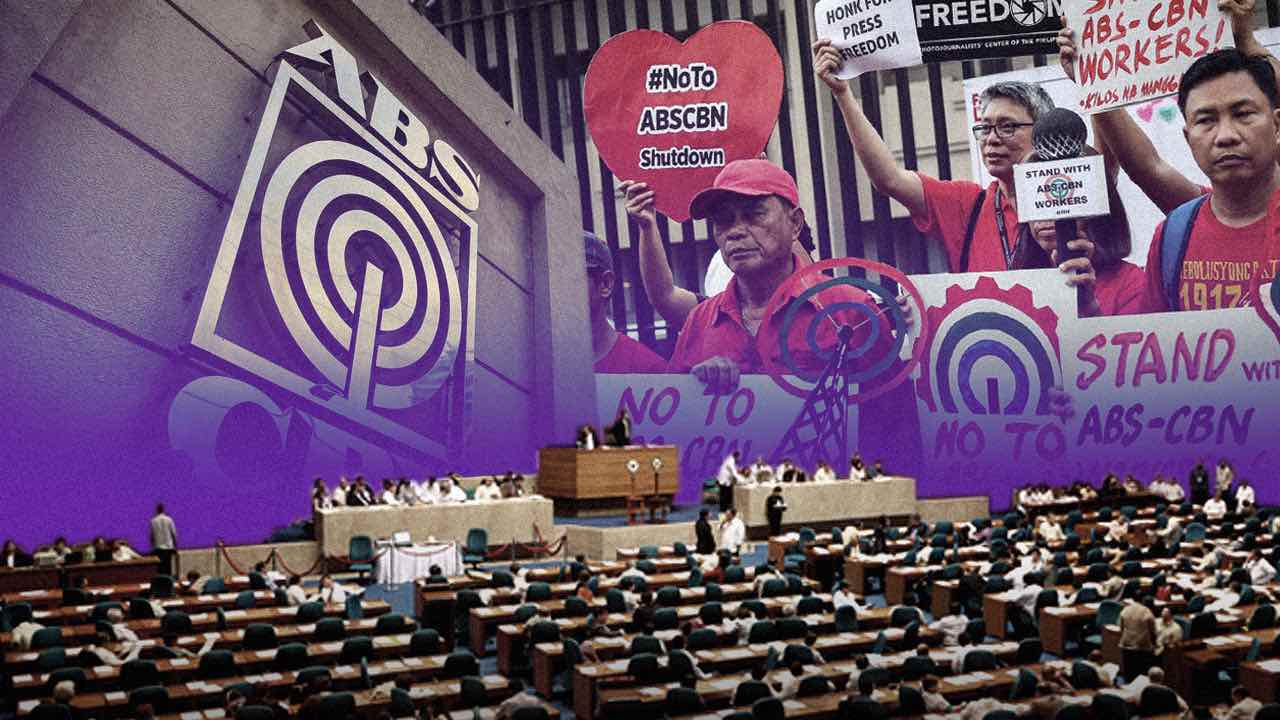

On Thursday, July 9, after 12 days of continuous hearings, the House Committee on Legislative Franchises is set to vote on the ABS-CBN franchise renewal application. This is a moment of truth for the broadcast company, which is the biggest in the country. One can only hope that our representatives will do the right thing for Filipino families, for our people, and for the country that is suffering from a pandemic. (READ: [ANALYSIS] Duterte and Congress closed down ABS-CBN)
Wrong reasons to deny renewal
During the successive hearings in the House Committee, many accusations have been thrown against ABS-CBN, including tax evasion, labor law violations, political bias in its news coverage, and foreign ownership and citizenship issues.
As to the supposed tax evasion committed by ABS-CBN, House Deputy Speaker Rodante Marcoleta said that the company violated the terms and conditions of its legislative franchise due to "tax avoidance schemes.” This accusation however was belied by no less than the Bureau of Internal Revenue, which said that the company and its subsidiaries paid their taxes from 2016 to 2019.
On the purported labor law violation, the Department of Labor and Employment (DOLE) alleged that ABS-CBN was not compliant with labor laws and standards after it found some violations during an inspection conducted from July to September 2018. However, learning of its deficiencies, ABS-CBN immediately made corrective measures which prompted the DOLE on January 28, 2020 to issue an order clearing the media corporation of violations.
On the alleged political bias of the network, I can only say that ABS-CBN is a network that follows the basic norms of broadcast journalism. It is a competitive, world-class organization with aggressive and opinionated anchors as well as independent-minded and resourceful correspondents, something I have experienced directly, as I am frequently a guest on their shows and interviewed by its reporters. If ABS-CBN has its faults, I would point to its attention to its ratings, which tempt it to be more sensationalist in broadcasting the news.
In any case, freedom of the press means we allow media organizations to have their editorial freedom.
On the charge that its entertainment shows are immoral, this long-time fan of ABS-CBN soap operas can testify that the network’s shows are almost all for General Patronage. When a boundary is crossed, and that is rare, it is usually justified by artistic license.
Frankly, watching ABS-CBN Chairman emeritus Gabby Lopez III and ABS-CBN executives Carlo Katigbak, Cory Vidanes, and Ging Reyes testify in the hearing have convinced me that the future of this network is in great hands. Their dignity, compassion, patriotism, and mastery of the business and their craft was manifest and impressive.
Foreign ownership and citizenship non-issues
Foreign investors do not own ABS-CBN shares. Philippine depositary receipts are investment tools and nothing more. As in the case of the other networks and media organizations that issue them, PDRs do not result in foreign ownership or any amount of foreign control in that company.
On the citizenship of Mr Lopez, the revelation that he is a dual Filipino and American citizen should close that issue. The Constitution does not distinguish between Filipinos who are dual citizens upon birth and Filipinos who are dual citizens in relation to the nationality requirement for certain economic sectors. Gabby Lopez, when he was the CEO of the network and now, can own as many shares of ABS-CBN as he wants. (READ: [EXPLAINER] Manila Times 'exposé' grossly false about Gabby Lopez's citizenship)
Reasons for renewing ABS-CBN’s franchise
A yes vote for renewal will save 11,000 jobs. A no vote will result in the uncertain futures of tens of thousands of Filipinos – the workers of the network and their families. (READ: Cayetano on ‘conscience vote’ in ABS-CBN franchise: ‘I cannot speak for parties’)
Let’s be clear: the closure of ABS-CBN will be an economic disaster for the country and for many families. Easily a hundred thousand Filipinos will be negatively affected if the House of Representatives decides to close down the network. Aside from its permanent workers and contractors, also affected will be suppliers, banks, and businesses such as restaurants around its stations in Quezon City and elsewhere. In my view, those responsible for the closure should be accountable for the economic havoc such closure will cause.
The closure of ABS-CBN is economic sabotage in ordinary times; in the time of the coronavirus pandemic, with the economy reeling from the lockdowns and millions out of work, the impacts of such a decision by Congress would be colossal in the damage it will inflict on the country today and in the future. I cannot imagine why any policymaker would want that.
In the context also of a pandemic, especially now that infections are surging, the people need reliable news sources as well as good entertainment options. For those with internet access, they still have been able to access TV Patrol and their favorite shows, but that is temporary. It would be hard to continue that presence if the current situation is made permanent. Already, many people in the provinces and our islands have lost access to their only sources of news. This has life and death implications for many not just because of the pandemic but also because we are now in the typhoon season when timely information is essential for survival.
Finally, if the economic fate of thousands of families and the physical survival of many of our communities are not enough reason, members of the House Committee on Legislative Franchises might want to affirm its support for the great freedoms of the press, expression, and speech as well as the related right to information, all of which are enshrined in the Constitution.
A free press is at stake
From the very start, I have taken the position that the ABS-CBN franchise renewal is a free speech issue. The hearings actually confirm this with the kind of questions we heard from some representatives. The fate of ABS-CBN sends a chilling effect to other independent media outlets which are not in the same page with this administration. The message to media outlets critical of the government is clear – refuse to toe the line and you will end up like ABS-CBN.
Among our poltiicians, it’s the Binays of Makati that clearly get this. As Senator Nancy Binay pointed out, she believed that her family was not fairly treated by the network. Despite this, however, Binay expressed her intention to vote for the renewal of the network’s franchise because “it’s not about me,” adding that freedom of information and access to information are more important. Earlier in May, when the National Telecommunications Commission closed ABS-CBN, former vice-president Jojo Binay was quoted in Rappler as saying: “We hope that the men and women of ABS-CBN will continue to pursue the great calling of journalism in the service of the Filipino, especially in this period of uncertainty and anxiety over the COVID-19 pandemic and the creeping erosion of civil liberties, of which the network’s closure is an eloquent example.”
Tomorrow is a moment of truth for ABS-CBN. It is also a moment of truth for the House of Representatives, on whether its members are capable of fairness and voting for the national interest. It is also a moment of truth for the country as a closure vote will push us further into economic disaster and authoritarian darkness. – Rappler.com
Tony La Viña teaches law and is former dean of the Ateneo School of Government.